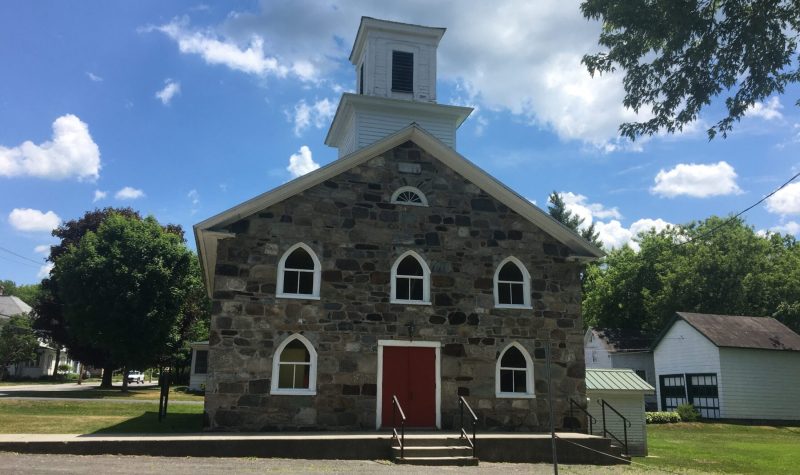Work on the Maison des générations - Olivet House project, spearheaded by the Sutton Volunteer Centre (CAB Sutton), has officially begun. Maison des générations - Olivet House is a social project with the aim of creating a community hub for all residents in Sutton and Abercorn through activities that are particularly organized around food.
The project involves transforming Olivet Church, which dates back to 1845. CAB Sutton purchased the Olivet Church a couple of years ago from its former congregation for $1 after numbers started to dwindle. The parish believed in the mission of CAB Sutton and they wanted to see the project become reality. The renovations will provide CAB Sutton with a space that will allow them to reach further into the community and carry out its work more efficiently.
As part of the Journées du patrimoine religieux on September 9, CAB Sutton is holding an event outside of Olivet House to highlight the project, what historical features will be persevered, and its expected social impacts. A presentation will be conducted in French starting at 10 a.m. and it will be followed by a presentation in English at 11 a.m.
“What’s interesting is that as we were doing this project, we realized that in those days it (Olivet Church) actually served a purpose of a meeting house. Not only was it a place of worship, but it was also a place used by the first pioneers for different town meetings and what not,” said Janna Hubacek, project manager for Maison des générations - Olivet House “So, in a way, we feel like we are sort of bringing it back to its roots.”
As an organization that focuses on food security, it operates the local food bank, a collective kitchen, and meals on wheels, it made sense for CAB Sutton to focus on the theme of food for its new space.
“Now, we are going to have these great infrastructures that are just going to allow us to do so much more for the community, to help alleviate any food security issues people might have, and to deliver health and social services to local communities in general,” noted Hubacek.
Work on the church began at the beginning of August to bring it up to code and to make it accessible, while also preserving its historical integrity as much as possible. It is financially support by the Conseil du patrimoine du Québec, the federal government, the town, and various organizations, businesses, and donors in the local community.
“It’s not at all insulated, the windows are single pane, the roof needs to be redone, the steeple is being renovated, plumbing, the mechanical systems, new electrical systems, but there is also a lot of structural elements because we are putting in a second floor in if you will,” explained Hubacek. “(…) We are putting in a kitchen and food facilities, an accessory building, and gardens.”
The goal of Olivet House is to bring people from all generations together under one roof through a variety of activities.
“For example, cooking activities, which, so far, the CAB has never owned a kitchen. So, to have a kitchen and to really be able do workshops and activities where families can come and sort of enjoy and learn perhaps some basic cooking skills together. Also, community meals is another opportunity to bring people together,” mentioned Hubacek.
Hubacek said that the hope is for CAB Sutton to reach more people in the community and to build on its partnerships.
“I think for anyone, in no matter what field you work, if you have the right tools you are so much more equipped to really deal with the needs that your clientele might have,” she said. “(…) Now that we’re going to have these great infrastructures, we can build on partnerships we have with organizations, the school, and whatever partner that we can fit in a collaboration around the gardening or maybe the town for events.”
On Friday, September 9, the community is invited to receive more information about the project as part of the Journées du patrimoine religieux.
“It is across all of Quebec and I think there are 200 different places of worship or churches that were transformed that can be visited. We are one of the spots people can come to,” mentioned Hubacek.
Listen to the full interview below:


